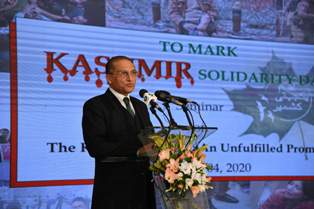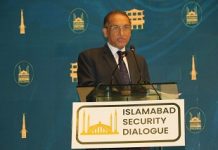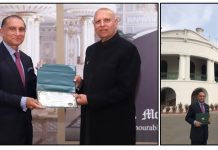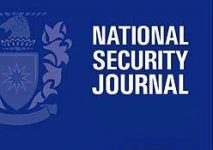The Kashmir Dispute: An unfulfilled Promise
Presidency, 4 February 2020
Welcome Remarks by the Director General
We have gathered today to mark the solidarity of Pakistani nation with the Kashmiris who are struggling for freedom, for their right to determine their own destiny.
ISSI is truly privileged to be chosen to organize this dignified event in the presidency. Thank you Mr President for offering the Presidency to signify the importance you attach to this expression of solidarity with the people of Kashmir.
I would also acknowledge the ministry of KA&GB for their efforts under the leadership of minister Gandapur and secretary Pasha to walk with the sentiment of our nation on the Kashmir issue.
Our tribute to chairman Kashmir committee Syed Fakhr Imam, who is an eloquent voice for the rights of the Kashmiris.
We at ISSI are privileged to have contributed our part in highlighting the Kashmir cause and remind ourselves and the international community that the Kashmiris were given a solemn promise seventy years ago by the international community as stipulated in the UNSC resolutions. That promise regrettably remains unfulfilled. On 5th August 2019, Modi administration unilaterally changed the status of occupied territory in violation of both the UNSC resolutions and Simla agreement, both of which prohibit any material change of status of the disputed territory. Along came a six months long siege of the Kashmiris, with every instrument of torture applied on them to break their will.
The saddest part is that many nations that claim to be the champions of human rights and turned a blind eye on the gross brutalities being inflicted on the Kashmiris. One wonders why. Why should the drafters of Universal Declaration of Human Rights stay quiet when they can clearly see whats happening to the people of Kashmir? Is it commercial interests or relations with India? Or is it that they do not see what we all and the rest of the world can see.
As we speak here, the Indian occupied Kashmir is bleeding. Report after report is emerging on the clampdown, the lockdown, the curfew imposed on the hapless Kashmiris.
What encourages us is that the collective conscience of the international community is not yet dead. There are voices, some of them highly potent, that are being raised.
I would like to singularly recognize the Association of parents of disappeared persons, under the leadership of a courageous Kashmiri Parveena Ahangar, has documented since 1994 the enforced disappearances, which constitute a crime against humanity and in fact a war crime as Kashmir is a conflict zone.
Human Rights Watch reports have also recorded an increasing trend of rape in remote and poor villages in IoK at the hands of Indian security forces. Since 1949, rape and forced prostitution are included in Geneva Convention as war crimes.
Amnesty International has spoken of detentions, the lack of press freedom, and attacks on religious freedom in India.
Expert scholars on Kashmir like Nitasha Kaul and Angana Chatterjee have spoken about the rise of Hindu majoritarianism, and its relationship to Nazism.
Eminent personalities like Bernie Sanders are calling for lifting the of communications blockade, and implementing UN backed peaceful resolution that respects the wishes of the Kashmiri people.
The labor party in the United Kingdom passed an emergency motion on Kashmir in support of the right of Kashmiris to self determination.
UN Secretary General and UN High Commissioner for Human Rights have both spoken several times.
India’s draconian laws are under constant criticism as these violate the basic norms of human behavior and violate international humanitarian law.
As the Kashmiris brave these harsh times, the people of Pakistan stand with them. Our message of solidarity must be unambiguous and firm.
Quaid e Azam called Kashmir as the jugular vein of Pakistan. For centuries the people of Kashmir and the people of Pakistan have interacted. These age old ties must be honored.
It is important that the think tank community and academia also play their part in this national and humanitarian cause. On behalf of the ISSI, I would like to affirm that we would continue to play our part in this regard.












